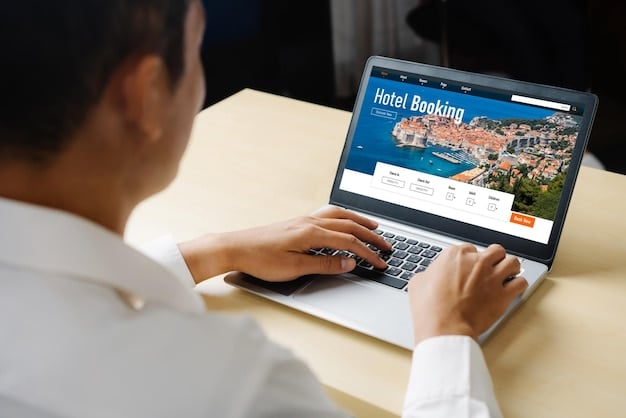How to Negotiate Hotel Rates & Score Accommodation Deals in the US

Anúncios
Finding accommodation deals and negotiating hotel rates like a pro in the US involves strategic planning, leveraging online resources, and mastering the art of negotiation to secure the best possible rates.
Planning a trip to the US doesn’t have to break the bank when it comes to accommodation. Knowing how to find accommodation deals: negotiate hotel rates like a pro in the US is a skill that can save you a significant amount of money, allowing you to enjoy more of your travel budget on experiences rather than lodging.
Anúncios
Mastering the Art of Hotel Negotiation: Your US Accommodation Guide
Securing great deals on hotels isn’t just about luck; it’s about strategy. In the US, the hotel industry is competitive, and understanding how to navigate this landscape can lead to substantial savings. From online tools to proven negotiation tactics, this guide will provide actionable steps to help you become a savvy traveler.
Research and Planning: The Foundation of a Good Deal
Before you even think about negotiating, thorough research is crucial. Knowing what the average rates are, understanding seasonal fluctuations, and identifying potential discounts will arm you with the information you need to negotiate effectively.
Anúncios
- Compare Rates: Use multiple online travel agencies (OTAs) and hotel websites to compare prices. Sites like Booking.com, Expedia, and Kayak can provide a comprehensive overview of available rates.
- Check Hotel Websites Directly: Sometimes, hotels offer better deals directly on their websites to avoid paying commissions to OTAs. Always compare the rates you find on OTAs with the hotel’s official site.
- Consider Alternative Accommodations: Explore options like Airbnb or VRBO. These platforms often provide more affordable options, especially for longer stays or group travel.
Planning also involves being flexible with your travel dates. If possible, travel during the off-season or shoulder season. Hotels are often more willing to negotiate when demand is lower.

Understanding the hotel’s pricing strategy is also beneficial. Look for patterns in pricing, such as higher rates on weekends or during local events. Being aware of these trends allows you to target your negotiations during less busy times.
Leveraging Online Tools for Accommodation Deals
In the digital age, numerous online tools are available to help you find the best accommodation deals. These tools can automate much of the research process, providing you with valuable insights and potential savings.
Price Comparison Websites
As mentioned earlier, price comparison websites are essential for finding the best rates. These sites aggregate prices from various sources, making it easy to compare your options. Ensure you’re comparing apples to apples by checking the fine print for any hidden fees or restrictions.
Deal Alert Services
Sign up for deal alert services that notify you when prices drop for hotels in your desired locations. Platforms like Google Flights and Hopper can track hotel prices and send you alerts when they decrease.
Utilizing Loyalty Programs
Hotel loyalty programs can provide significant discounts and perks. Join the loyalty programs of major hotel chains to earn points for your stays. These points can be redeemed for free nights, upgrades, and other benefits. Many programs also offer member-exclusive rates.
Beyond the well-known programs, explore smaller, independent hotel loyalty programs. These can sometimes offer more personalized rewards and unique experiences. Also, consider using travel credit cards that offer points or miles that can be redeemed for hotel stays.
Negotiation Tactics: The Art of the Deal
Once you’ve done your research and identified potential hotels, it’s time to start negotiating. Effective negotiation involves communication skills, confidence, and a willingness to walk away if the deal isn’t right.
Direct Communication: Contacting the Hotel
The most effective way to negotiate is by contacting the hotel directly. Call the hotel and speak with a manager or someone in the reservations department. Explain that you’ve done your research and are looking for the best possible rate.
Expressing Your Needs and Expectations
Clearly communicate your needs and expectations. Are you looking for a specific room type, amenities, or services? Let the hotel know what’s important to you.
- Ask for a Lower Rate: Simply ask if they can offer a lower rate than what you’ve found online. Hotel staff often have some leeway to adjust prices, especially if they have vacant rooms.
- Mention Competitor Rates: If you’ve found a lower rate at a competing hotel, mention it. Many hotels are willing to match or beat competitor prices to secure your business.
- Inquire About Packages and Discounts: Ask about any available packages or discounts, such as AAA or AARP discounts, or special rates for extended stays.

When negotiating, be polite and respectful. Hotel staff are more likely to work with you if you’re friendly and cooperative. Remember, they’re trying to fill rooms and provide good service, so approach the conversation with that in mind.
Timing is Everything: When to Negotiate
Timing plays a crucial role in your ability to negotiate hotel rates. Understanding when hotels are most likely to offer discounts can significantly increase your chances of success.
Last-Minute Bookings
Hotels are often more willing to negotiate rates for last-minute bookings to avoid having empty rooms. Check for deals on the same day of your stay, but be aware that availability may be limited.
Off-Season and Shoulder Season
Traveling during the off-season or shoulder season can greatly increase your negotiation power. With fewer tourists, hotels are eager to attract guests and may offer lower rates to fill their rooms.
Midweek Stays
Business travelers often fill hotels during the week, leaving weekends with lower occupancy rates. Consider booking midweek stays, as hotels may be more flexible with pricing during these times.
Also, keep an eye on local events and holidays that may affect hotel rates. Avoiding these peak times can save you money. Timing your visit strategically can give you an edge when negotiating for accommodations.
Beyond Rate: Negotiating Extras and Amenities
Negotiating isn’t just about the room rate; it’s also about the extras. Many hotels are willing to throw in additional amenities or services to sweeten the deal.
Requesting Upgrades
If you’re celebrating a special occasion or simply want a better room, don’t hesitate to ask for an upgrade. Hotels may be willing to upgrade you to a larger room or a suite at no extra cost, especially if they have availability.
Free Breakfast and Wi-Fi
Negotiate for complimentary breakfast or Wi-Fi. These are common amenities that hotels often provide for free, but it’s always worth asking if they’re not already included in your rate.
Parking and Other Perks
If you’re driving, negotiate for free parking. Hotels in urban areas often charge a hefty fee for parking, so removing this cost can save you a significant amount of money. Similarly, inquire about other perks such as access to the hotel’s fitness center or pool.
Remember that everything is negotiable. Even if a hotel can’t lower the room rate, they may be willing to offer additional amenities to make your stay more enjoyable.
Maintaining Flexibility and Being Prepared to Walk Away
A key aspect of successful negotiation is maintaining flexibility and being prepared to walk away if the deal isn’t right. Knowing your limits and having alternative options can empower you to make the best decision.
Setting a Budget
Before you start negotiating, set a budget for your accommodation. This will help you stay within your means and avoid overspending. Knowing your budget will guide your negotiations and prevent you from accepting deals that don’t fit your financial plan.
Having Alternative Options
Always have alternative accommodation options in mind. This gives you leverage and allows you to walk away from a negotiation if the hotel isn’t willing to meet your needs.
Knowing When to Walk Away
Recognize when it’s time to walk away. If a hotel isn’t willing to offer you a reasonable rate or the amenities you’re looking for, be prepared to take your business elsewhere.
Ultimately, successful negotiation requires a combination of research, communication skills, and a willingness to be flexible. By utilizing these strategies, you can secure great deals on accommodation and enjoy a more affordable and enjoyable travel experience in the US.
| Key Point | Brief Description |
|---|---|
| 🔍 Research Thoroughly | Compare rates on OTAs and hotel websites to find the best deals. |
| 📞 Contact Directly | Call the hotel to negotiate, mentioning competitor rates. |
| 🗓️ Time Strategically | Book last-minute, off-season, or midweek for better rates. |
| 🎁 Negotiate Extras | Ask for upgrades, free breakfast, Wi-Fi, or parking. |
FAQ Section
▼
Popular options include Booking.com, Expedia, Kayak, and Hotels.com. Always check the hotel’s official website as well, as they sometimes offer better deals to avoid OTA commissions.
▼
It varies, but generally, booking well in advance (2-3 months) can secure better rates. However, last-minute deals can also be found, especially if the hotel has vacant rooms.
▼
Be polite, mention competitor rates, ask for discounts or packages, and inquire about upgrades. Clearly communicate your needs and be ready to negotiate extras like free breakfast or parking.
▼
Midweek stays (Tuesday to Thursday) often have lower rates than weekends, as hotels may have fewer business travelers during those times.
▼
Be prepared to walk away and consider alternative accommodations. Check other hotels in the area or explore options like Airbnb or VRBO. Flexibility is key to finding the best deals.
Conclusion
In conclusion, mastering the art of negotiating hotel rates in the US is an achievable goal with the right strategies. By conducting thorough research, leveraging online tools, communicating effectively, and maintaining flexibility, you can secure great deals and enjoy more affordable and enjoyable travel experiences.





